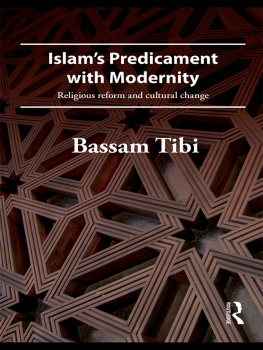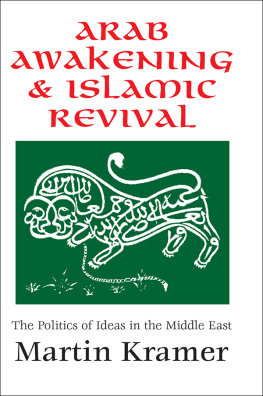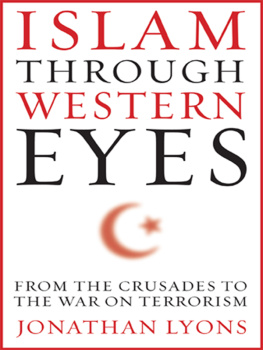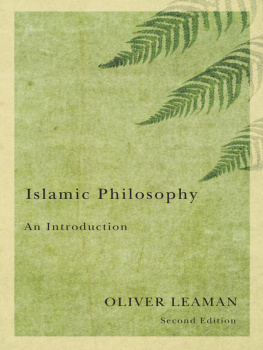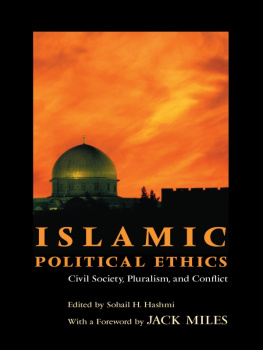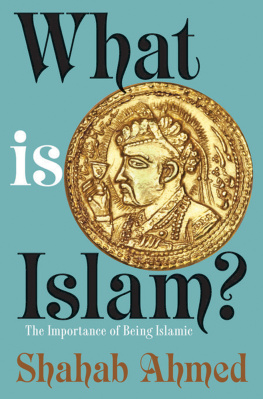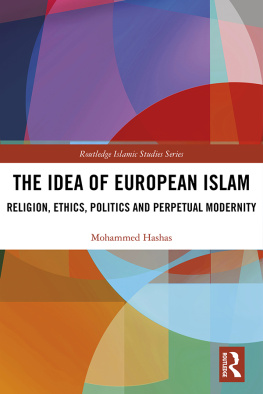ROUTLEDGE LIBRARY EDITIONS: POLITICS OF ISLAM
ISLAM IN PERSPECTIVE
ISLAM IN PERSPECTIVE
A Guide to Islamic Society, Politics and Law
PATRICK BANNERMAN
Volume 6
First published 1988
This edition first published in 2013
by Routledge
2 Park Square, Milton Park, Abingdon, Oxon OX14 4RN
Simultaneously published in the USA and Canada
by Routledge
711 Third Avenue, New York, NY 10017
Routledge is an imprint of the Taylor & Francis Group, an informa business
1988 J.P. Bannerman
All rights reserved. No part of this book may be reprinted or reproduced or utilised in any form or by any electronic, mechanical, or other means, now known or hereafter invented, including photocopying and recording, or in any information storage or retrieval system, without permission in writing from the publishers.
Trademark Notice: Product or corporate names may be trademarks or registered trademarks, and are used only for identification and explanation without intent to infringe.
British Library Cataloguing in Publication Data
A catalogue record for this book is available from the British Library
ISBN: 978-0-415-64437-2 (set)
eISBN: 978-0-203-07906-5 (set)
ISBN: 978-0-415-83077-5 (Volume 6)
eISBN: 978-0-203-38139-7 (Volume 6)
Publisher's Note
The publisher has gone to great lengths to ensure the quality of this reprint but points out that some imperfections in the original copies may be apparent.
Disclaimer
The publisher has made every effort to trace copyright holders and would welcome correspondence from those they have been unable to trace.
ISLAM IN PERSPECTIVE: A GUIDE TO ISLAMIC SOCIETY, POLITICS AND LAW
The Royal Institute of International Affairs is an independent body which promotes the rigorous study of international questions and does not express opinions of its own. The opinions expressed in this publication are the responsibility of the author.
ISLAM IN PERSPECTIVE
A GUIDE TO ISLAMIC SOCIETY, POLITICS AND LAW
PATRICK BANNERMAN
ROUTLEDGE
London and New York
for
THE ROYAL INSTITUTE OF
INTERNATIONAL AFFAIRS
London
First published 1988 by
Routledge
a division of Routledge, Chapman and Hall
11 New Fetter Lane, London EC4P 4EE
Published in the USA by
Routledge
a division of Routledge, Chapman and Hall, Inc.
29 West 35th Street, New York NY 10001
1988 J.P. Bannerman
Printed and bound in Great Britain by
Biddies Ltd, Guildford and King's Lynn
Phototypeset in IOpt Baskerville by
Mews Photosetting, Beckenham, Kent
All rights reserved. No part of this book may be reprinted or reproduced or utilized in any form or by any electronic, mechanical, or other means, now known or hereafter invented, including photocopying and recording, or in any information storage or retrieval system, without permission in writing from the publishers.
British Library Cataloguing in Publication Data
Bannerman, Patrick
Islam in perspective: a guide
to Islamic society, politics and law.
1. Islam Revival Political aspects
I. Title
297.1977
ISBN 0-415-01015-2
Today we are all increasingly involved with Muslims: some of us work in the Muslim world; some have business dealings with Muslims; and some have Muslim friends and neighbours. However, while recognizing that Muslim beliefs and practices are central influences on individual Muslims and on Muslim society, we may have difficulty in understanding what Islam is and what it means to Muslims. That difficulty is often compounded by the diversity in beliefs and practices. There are, of course, many valuable academic studies of Islam, using that term in its widest sense. However, having spent most of my working life working with Muslims and studying the history, politics, culture, and society of the Muslim world, I have come to the conclusion that these studies are not wholly satisfactory for those who seek a broad understanding of Islam today and of its historical development, but who may have neither the time nor the inclination to embark upon a rigorous academic examination of Islam. It follows that I believe that a different approach is more practical.
This volume draws together my thinking and my conclusions about Islam. It is, admittedly, selective in that I have concentrated upon those aspects which are of most concern to my colleagues: my aim has been to provide a general background and a broadly based consideration of the Islamic revival rather than a detailed and comprehensive study. Many of the themes and ideas elaborated in what follows have been developed over a number of years: but the opportunity to clarify my thinking, test my ideas against the evidence, and set them down in connected form did not occur until I was granted a sabbatical year, which I spent as Diplomat-in-Residence in the Woodrow Wilson Department of Government and Foreign Affairs of the University of Virginia in Charlottesville.
I must stress, however, that the views, opinions, and interpretations set out in this study are my own: they do not necessarily represent those of the Foreign and Commonwealth Office (FCO).
There are a number of technical points which should be noted, mostly relating to transliteration, which is always problematic. In what follows I have generally omitted diacritical marks but have otherwise followed the transliteration system which I learned as a student. I have not, however, distinguished between an 'ayn and a hamza, both of which are indicated by an apostrophe. To do so seemed to me to be otiose for Arabists and to clutter the text unnecessarily for others. Plurals of Arabic words have normally been formed by simply adding an s to the singular. For convenience, I have used the Arabic for theological, doctrinal, legal, and other technical terms, but in order to assist the reader I have appended a full glossary of such terms. I have also appended brief biographical notes on the major historical figures mentioned or cited in this study since I consider the alternative parenthetical explanations is distracting. I have nevertheless inserted a brief definition when a term is used for the first time. Finally, I have included suggestions for further reading, but these are both selective and subjective.
It is, of course, a privilege to appear under the imprimatur of the Royal Institute of International Affairs. I am accordingly grateful to the Institute for its ready agreement to a sponsorship which seems entirely appropriate in view of my employment. I am also grateful to both the FCO and the University of Virginia for making this study possible. My thanks are due to my temporary academic colleagues in Charlottesville for their support, interest and encouragement; to the many friends I made in Charlottesville, who helped to make my stay there an unforgettable experience; and to the students, who made intelligent and stimulating company. It is always invidious to single out individuals, but I must note in particular Robert Evans and Inis Claude among my academic colleagues; Cora and Grover Pitts and Nesta Ramazani among my friends; and a small but very lively group of disputatious students. I would also like to place on record my thanks to my long-suffering colleagues in the FCO Research Department.


